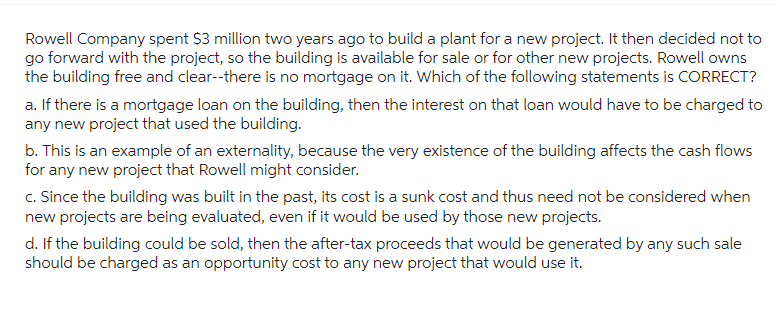Rowell Company spent $3 million two years ago to build a plant for a new project. It then decided not to go forward with the project, so the building is available for sale or for other new projects. Rowell owns the building free and clear--there is no mortgage on it. Which of the following statements is CORRECT? a. If there is a mortgage loan on the building, then the interest on that loan would have to be charged to any new project that used the building. b. This is an example of an externality, because the very existence of the building affects the cash flows for any new project that Rowell might consider. c. Since the building was built in the past, its cost is a sunk cost and thus need not be considered when new projects are being evaluated, even if it would be used by those new projects. d. If the building could be sold, then the after-tax proceeds that would be generated by any such sale should be charged as an opportunity cost to any new project that would use it.
Rowell Company spent $3 million two years ago to build a plant for a new project. It then decided not to go forward with the project, so the building is available for sale or for other new projects. Rowell owns the building free and clear--there is no mortgage on it. Which of the following statements is CORRECT? a. If there is a mortgage loan on the building, then the interest on that loan would have to be charged to any new project that used the building. b. This is an example of an externality, because the very existence of the building affects the cash flows for any new project that Rowell might consider. c. Since the building was built in the past, its cost is a sunk cost and thus need not be considered when new projects are being evaluated, even if it would be used by those new projects. d. If the building could be sold, then the after-tax proceeds that would be generated by any such sale should be charged as an opportunity cost to any new project that would use it.
SWFT Essntl Tax Individ/Bus Entities 2020
23rd Edition
ISBN:9780357391266
Author:Nellen
Publisher:Nellen
Chapter12: Corporations: Organization, Capital Structure, And Operating Rules
Section: Chapter Questions
Problem 31P
Related questions
Question

Transcribed Image Text:Rowell Company spent $3 million two years ago to build a plant for a new project. It then decided not to
go forward with the project, so the building is available for sale or for other new projects. Rowell owns
the building free and clear--there is no mortgage on it. Which of the following statements is CORRECT?
a. If there is a mortgage loan on the building, then the interest on that loan would have to be charged to
any new project that used the building.
b. This is an example of an externality, because the very existence of the building affects the cash flows
for any new project that Rowell might consider.
c. Since the building was built in the past, its cost is a sunk cost and thus need not be considered when
new projects are being evaluated, even if it would be used by those new projects.
d. If the building could be sold, then the after-tax proceeds that would be generated by any such sale
should be charged as an opportunity cost to any new project that would use it.
Expert Solution
This question has been solved!
Explore an expertly crafted, step-by-step solution for a thorough understanding of key concepts.
This is a popular solution!
Trending now
This is a popular solution!
Step by step
Solved in 3 steps

Knowledge Booster
Learn more about
Need a deep-dive on the concept behind this application? Look no further. Learn more about this topic, finance and related others by exploring similar questions and additional content below.Recommended textbooks for you








Financial Accounting
Accounting
ISBN:
9781305088436
Author:
Carl Warren, Jim Reeve, Jonathan Duchac
Publisher:
Cengage Learning

Business Its Legal Ethical & Global Environment
Accounting
ISBN:
9781305224414
Author:
JENNINGS
Publisher:
Cengage